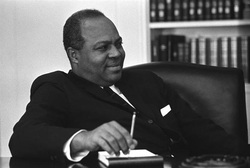James Farmer (1920-1999)
Co-Founder & First National Director, Congress of Racial Equality

Born in Marshall, Texas, Farmer was an educator, administrator, and one of the founders of the Congress of Racial Equality-CORE.
Raised in an environment that valued education and religious faith, James Farmer was an outstanding student. After skipping several grades in elementary school, he entered Wiley College in Marshall, Texas at the age of 14 (where his father had taught and was one of the few African American Ph.D.s in the South). A principal on Wiley's national champion debate team, he graduated in 1938 and went on to study at Howard University's School of Religion. He graduated from Howard in 1941. Farmer opposed war in general, and more specifically objected to serving in the segregated Armed Forces. When the U.S. entered World War II later that year, he applied for conscientious objector status but found he was deferred from the draft because he had a divinity degree.
Rather than become an ordained Methodist minister, Farmer told his father he would rather fight that church's policy of segregated congregations, and chose instead to work for the Fellowship of Reconciliation (FOR). Farmer was FOR's Secretary for Race Relations, helping the pacifist Quaker Organization craft its responses to such social ills as war, violence, bigotry and poverty. It was a job that left Farmer, who was then living in Chicago, Illinois, enough time to begin forming his own approach to these issues; an approach based less on FOR's religious pacifism than on the principle of nonviolent resistance.
By the late 1960s, Farmer concluded that CORE had drifted away from its Gandhian roots. He left the organization he had helped found and had led for more than 20 years. Always an active writer and speaker, he continued to lecture publicly on civil rights and eventually took a teaching position at Lincoln University in Pennsylvania. In 1968, Farmer ran for Congress on the Republican Party ticket but was defeated by Shirley Chisholm, an African-American running as a Democrat. Shortly thereafter, he went to work for President Richard Nixon's administration as Assistant Secretary of Health, Education and Welfare.
In the years following his retirement from politics in 1971, Farmer served on many boards, including the Coalition of American Public Employees. He also continued to teach and to lecture widely. In 1985, he published his autobiography, titled "Lay Bare the Heart," and in 1998 President Bill Clinton awarded him the Congressional Medal of Freedom. Farmer died in 1999, but his early life and legacy were recently brought to new national prominence by the highly acclaimed film, "The Great Debaters." Starring Denzel Washington, Forest Whitaker and Denzel Whitaker, the movie vividly recalls the racial tensions of the 1930s. The movie but primarily celebrates the Wiley College Debate Team, which a 14-year-old James Farmer helped lead to a national championship, when it defeated the team from Harvard University in 1935.
Raised in an environment that valued education and religious faith, James Farmer was an outstanding student. After skipping several grades in elementary school, he entered Wiley College in Marshall, Texas at the age of 14 (where his father had taught and was one of the few African American Ph.D.s in the South). A principal on Wiley's national champion debate team, he graduated in 1938 and went on to study at Howard University's School of Religion. He graduated from Howard in 1941. Farmer opposed war in general, and more specifically objected to serving in the segregated Armed Forces. When the U.S. entered World War II later that year, he applied for conscientious objector status but found he was deferred from the draft because he had a divinity degree.
Rather than become an ordained Methodist minister, Farmer told his father he would rather fight that church's policy of segregated congregations, and chose instead to work for the Fellowship of Reconciliation (FOR). Farmer was FOR's Secretary for Race Relations, helping the pacifist Quaker Organization craft its responses to such social ills as war, violence, bigotry and poverty. It was a job that left Farmer, who was then living in Chicago, Illinois, enough time to begin forming his own approach to these issues; an approach based less on FOR's religious pacifism than on the principle of nonviolent resistance.
By the late 1960s, Farmer concluded that CORE had drifted away from its Gandhian roots. He left the organization he had helped found and had led for more than 20 years. Always an active writer and speaker, he continued to lecture publicly on civil rights and eventually took a teaching position at Lincoln University in Pennsylvania. In 1968, Farmer ran for Congress on the Republican Party ticket but was defeated by Shirley Chisholm, an African-American running as a Democrat. Shortly thereafter, he went to work for President Richard Nixon's administration as Assistant Secretary of Health, Education and Welfare.
In the years following his retirement from politics in 1971, Farmer served on many boards, including the Coalition of American Public Employees. He also continued to teach and to lecture widely. In 1985, he published his autobiography, titled "Lay Bare the Heart," and in 1998 President Bill Clinton awarded him the Congressional Medal of Freedom. Farmer died in 1999, but his early life and legacy were recently brought to new national prominence by the highly acclaimed film, "The Great Debaters." Starring Denzel Washington, Forest Whitaker and Denzel Whitaker, the movie vividly recalls the racial tensions of the 1930s. The movie but primarily celebrates the Wiley College Debate Team, which a 14-year-old James Farmer helped lead to a national championship, when it defeated the team from Harvard University in 1935.

